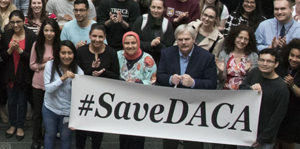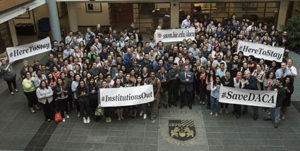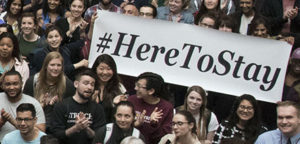by Mark G. Kuczewski, Ph.D. Danish Zaidi, MTS, MBE
Imagine that the 14th Amendment is repealed. Suddenly, birthright citizenship is no longer the accepted law of the United States. African-Americans become largely seen as non-citizens because many of their ancestors’ mode of forced entry into the United States (i.e., via slave ship). As non-citizens without valid immigration papers, they can no longer be lawfully employed and are denied routine opportunities in most states such as being able to obtain a driver’s license. This population is excluded from all government “benefits:” They cannot obtain a federal student loan and they cannot purchase a health insurance policy on the exchanges created by the Affordable Care Act. These individuals are essentially considered “alien” to the United States and deportation to their country of ancestry becomes a possibility. In such a scenario, what are the moral responsibilities of each citizen? Do health-care professionals and academics have any special responsibilities?
 These questions are pressing because we face a close analog of this situation with the rescission of the Deferred Action for Childhood Arrivals (DACA) program. DACA recipients are people who were brought to the United States as children or adolescents and were raised and educated herein. By virtue of environment and upbringing, they essentially became Americans in every way except in the eyes of the federal government. In most cases, these individuals have known no other country but America — yet they will soon face deportation.
These questions are pressing because we face a close analog of this situation with the rescission of the Deferred Action for Childhood Arrivals (DACA) program. DACA recipients are people who were brought to the United States as children or adolescents and were raised and educated herein. By virtue of environment and upbringing, they essentially became Americans in every way except in the eyes of the federal government. In most cases, these individuals have known no other country but America — yet they will soon face deportation.
Such an assault on basic fairness and justice is a major civil rights issue and imposes a duty to foster change on all members of society. We believe that professionals such as academics and healthcare providers incur specific obligations. Through the resources of their professions, individuals can promote justice by funding scholarships and advocating for students. But individual effort cannot solve the problem alone; their work must serve as impetus for organizational change. Our universities and healthcare facilities should strive to become places where we can expect equity and fairness for our undocumented population, rather than a tacit acceptance of the injustice of DACA’s rescission. In doing so, we must follow the lead of academic and healthcare institutions that have sought to incorporate qualified members of this group within educational and training programs, and ultimately, within the healthcare workforce.
Who are DACA recipients and how did DACA affect them?
DACA recipients are undocumented immigrants who were brought to the United States before the age of 16, lived in the United States for at least five years, have no significant criminal history, and were under the age of 31 on June 15, 2012. The approximately 800,000 DACA recipients and their peers of similar profiles are sometimes termed “Dreamers” after the never-passed legislation known as the DREAM Act. The DREAM Act would provide a path to citizenship for this population. Initially introduced in 2001 (and reintroduced currently as the DREAM Act of 2017), its languishing illustrates the long-developing nature of this problem over several decades.
Socioeconomic conditions including an increasingly globalized economy, a need for labor, and an aging population led to a significant increase in immigration to the United States in the 1990s and early 2000s. U.S. immigration law failed to keep pace and in 1996, Congress enacted legislation that added barriers to adjusting immigration status thereby creating a growing class of undocumented persons. Increasingly harsh laws deny our undocumented population many of the social conditions necessary to thrive such as the ability to obtain a federal student loan or to buy a market-based insurance policy. Such laws construe these basic opportunities as “benefits” to which these persons are not entitled.
In many instances, these youths are unaware of their unauthorized immigration status until they reach an age at which they seek part-time employment or driver’s license. They then come to “learn to be“illegal””The life-limiting implications associated with this permeate virtually all major aspects of their existence — and as such, being undocumented is sometimes termed a “master status.”
reach an age at which they seek part-time employment or driver’s license. They then come to “learn to be“illegal””The life-limiting implications associated with this permeate virtually all major aspects of their existence — and as such, being undocumented is sometimes termed a “master status.”
This immigration status often robs individuals of access to higher education. While significant numbers managed to find ways to attend college, economic barriers suppressed college entry and graduation rates among undocumented youth. They were ineligible for financial aid and were being charged out-of-state tuition rates by their state universities. A lack of hope to achieve lawful work opportunities compounded this problem and likely contributed to high dropout rates of undocumented youth at the high school level.
The Deferred Action for Childhood Arrivals (DACA) program mitigated many of these negative outcomes. DACA enables some of the social conditions associated with health. For instance, a DACA recipient can work lawfully, can obtain a driver’s license, and has reason to be free of the fear that a chance interaction with law enforcement will lead to deportation. It is worth noting that the criteria for DACA eligibility also incentivize education by requiring that the applicant be currently in school or have attained a high school diploma or its equivalent.
DACA set in motion numerous positive trends: It improved access to higher education and scholarship opportunities. While universities had never been barred from enrolling undocumented students, the improved prospects for utilizing such education encouraged educational institutions to open eligibility to more resources. Nevertheless, with no access to federal student loans, some DACA recipients balance school with work and enrolled in two-year colleges and trade schools. Many recipients report that DACA enabled them to obtain their first job and approximately two-thirds reported obtaining employment that better suited their skills. The average hourly wages of DACA recipients rose significantly (69-84%) and they are significantly more likely to start their own businesses than other Americans.
The story of undocumented youth in the United States in the last 30 years is an odyssey from total marginalization to quasi-acceptance into society — a transition facilitated by DACA. This narrative has now reached a crisis with the rescission of DACA. As they expire out of the program, DACA recipients will be exiled “to the shadows” in which most of the undocumented population lives. There, they will be bereft of opportunity and threatened by the constant fear of deportation. The blatant unfairness and rank cruelty of this exile makes the present a defining moral moment for every American.
The Required Response
When a law is patently unjust and arbitrarily excludes persons from the community without a reasonable justification, all citizens have a duty to seek change to that law. Failing to engage such an issue by claiming that academics or professionals have no place in “politics” — that they will be compromised by taking public stands — contributes to an unjust status quo. This is made clear when we retrospectively consider the behavior of individuals and institutions during the era of Jim Crow laws. To be silent was to be complicit as average Americans continued to work in and contribute to segregated institutions, reinforcing the status quo. To not repeat that apathy, we offer three recommendations.
 First, professionals must use their voices and lobbying power to advocate for a pathway to citizenship such as the DREAM Act of 2017 or equivalent legislation. It is incumbent on professional organizations to issue clear and unequivocal statements that address the fundamental moral issues that follow from rescinding DACA. These statements ought to set forth arguments based on their particular professional expertise e.g., an increased healthcare workforce shortage by excluding DACA recipients.
First, professionals must use their voices and lobbying power to advocate for a pathway to citizenship such as the DREAM Act of 2017 or equivalent legislation. It is incumbent on professional organizations to issue clear and unequivocal statements that address the fundamental moral issues that follow from rescinding DACA. These statements ought to set forth arguments based on their particular professional expertise e.g., an increased healthcare workforce shortage by excluding DACA recipients.
Second, academics and healthcare professionals must find ways to contribute to a reasoned understanding of immigration and its place within our social, cultural, and economic life. The current climate has been dominated by the demonization of immigrants as criminals. We must work toward laying a long-term conceptual and practical foundation for the ongoing discussion of migration that is required by our contemporary world. Academics and health-care professionals possess the skills to distill knowledge for public consumption through social media or opinion-editorials.
Most importantly, academics and professionals must promote justice for undocumented immigrants within their institutions. In 2012, Loyola University Chicago’s Stritch School of Medicine became the first medical school in the United States to make public its intent to recruit and accept qualified DACA recipients. Stritch now enrolls 32 DACA recipients and there may be as many as 100 enrolled nationwide. According to the American Medical Association, the DACA recipient population could contribute more than 5,000 primary care physicians in the coming decades, a contribution that would help address the shortage of primary care physicians. But the primary motivation for inclusion is simply that it is right. While diversity has its undeniable benefits, apartheid is unequivocally morally unacceptable. It must be dismantled within our institutions regardless of legislative developments or a lack thereof. Implementing this principle can require extraordinary effort, particularly in overcoming barriers we have noted such as lack of access to federal student loans. Nevertheless, we must continue to directly empower the dispossessed by creating opportunities for integration into society and to directly influence their own futures.